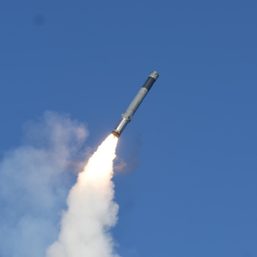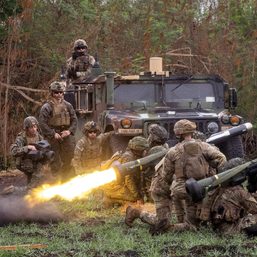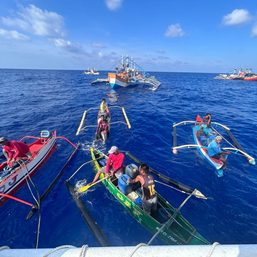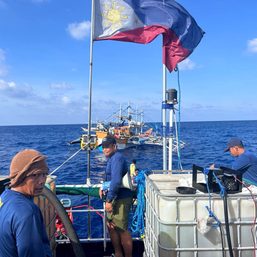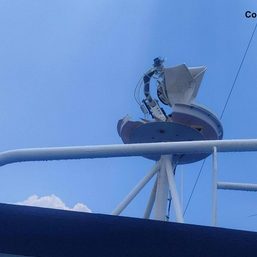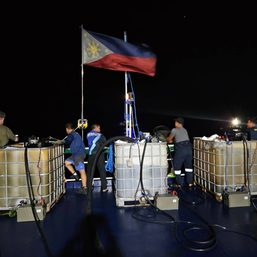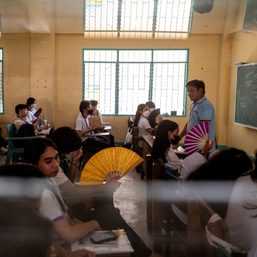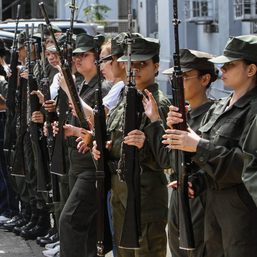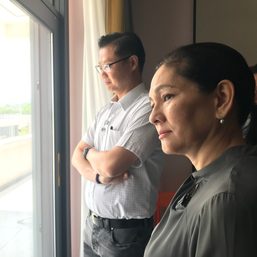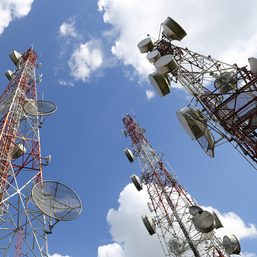The Armed Forces of the Philippines (AFP) wants only Filipino engineers to work on cell sites Dito Telecommunity will build in military bases – and it wants full, free access to them, AFP intelligence chief Major General Jose Eriel Niembra said on Wednesday, September 16.
These are among additional safeguards the AFP is “contemplating” to insert into its contract with the China-backed telco, in order to ward off possible attempts at “intrusion.”
The newly appointed chief of the Intelligence Service of the AFP (ISAFP), Niembra faced the congressional Commission on Appointments (CA) to confirm his appointment and promotion as a two-star general.
At the CA hearing, Senator Risa Hontiveros asked Niembra to state his opinion on the military’s cell sites deal with Dito, which several experts and lawmakers have flagged as a security risk.
Dito is 40% owned by Beijing-run China Telecom, in consortium with Udenna Corporation and Chelsea Logistics, both owned by Filipino businessman Dennis Uy.
“Actually, there are already Smart and Globe cell sites inside the military camps all over the country – not all camps, but some of the camps – and we have not experienced any problem so far,” Niembra told the panel.
“The question is with Dito communications because we perceive that because of this, its Chinese nature, there may be threats,” he added.
The general then cited a risk analysis done by the AFP based on existing arrangements with the two older telcos, which found vulnerabilities to radio frequency interception, eavesdropping, and jamming. Although the study showed these threats were highly likely to occur, it concluded the net risks were low because of control measures the AFP already had or was planning to acquire.
“So there’s low risk or low possibility that these cell sites might intrude into our networks, but nevertheless, the AFP now is contemplating adding several provisions in the MOA (memorandum of agreement) to act as safeguards against this possible eavesdropping, getting of information, or intrusion into our networks,” Niembra added.
The general noted that Defense Secretary Delfin Lorenzana recently signed his approval of the MOA between the military and Dito, after deferring it for nearly a year because of these security concerns.
To ensure loyalty ‘to our side’
The following are the provisions that, according to Niembra, the AFP would add to the MOA:
- Employment of all-Filipino engineers “just to make sure that their loyalty is to the Philippines, to our side”
- That these engineers be present during installation and maintenance of the cell sites
- Free access “anytime we want” to the facilities, including for security audits
“All of these is to make sure that we will prevent intrusion or breaching of our own networks, aside from the fact that we have competent technical people to see to it that our communications will not be breached,” Niembra said.
The security clause of the original MOA signed by Dito and the AFP on September 11, 2019, stated the following:
- “Access to the sites/facilities of either party shall be restricted and controlled by the Host (AFP) in the interest of security. Consequently, only authorized persons as determined by the Parties shall be allowed access to said sites/facilities.”
- “The Host shall allow access to the Co-locator’s (Dito) site attendants in the location sites. The attendants shall be determined by the Co-locator, subject to approval of the Host.”
- “Mislatel guarantees that the devices, equipment, and/or structures installed at the site provided by the AFP shall not be used by the Co-locator and/or any other entity to obtain classified information from the AFP.”
Mislatel is the former name of Dito Telecommunity.
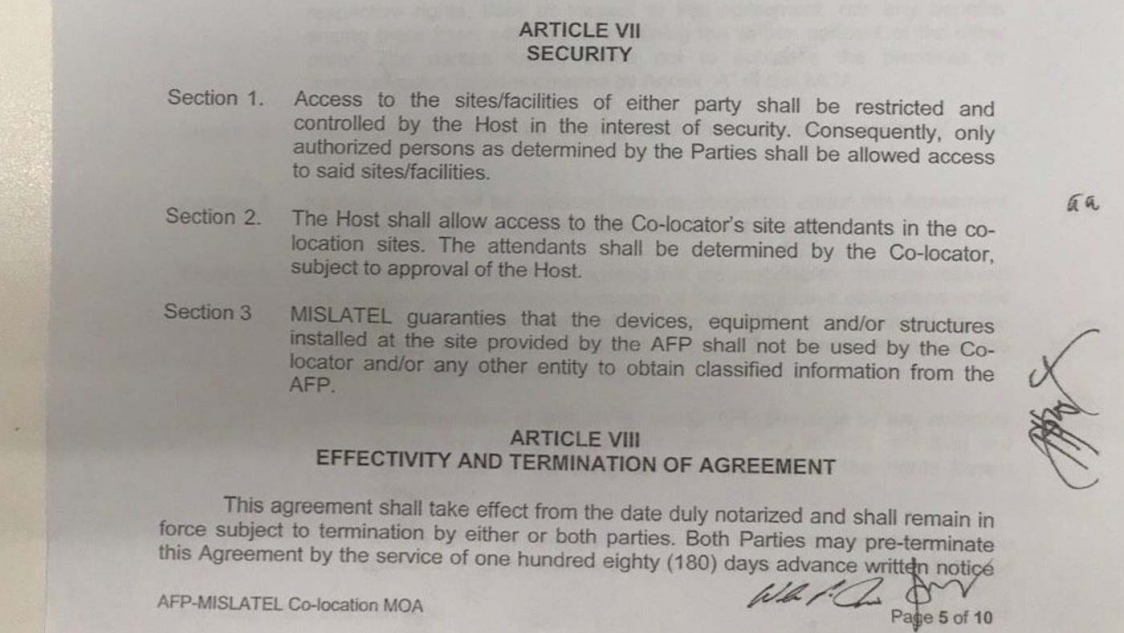
Hontiveros said she “appreciates” Niebra’s responses and the AFP’s efforts, such as running a risk analysis of the agreement. However, the opposition senator had her reservations.
“Kung hindi 40% China-owned ang isang kumpanya sa loob ng mga kampo natin (If the company inside our camps weren’t 40% owned by China), we wouldn’t even have to think let alone worry about loyalty, or which side they’ll favor,” Hontiveros said.
She said she was taken aback that it is the AFP asking for free access to its own premises.
“Bilang Filipino naano ako do’n ah – wow! Kailangan pa tayong i-grant ng access, ‘di katulad sa kasalukuyan na ang mga buong kampo natin ay clearly 100% in Philippine hands at hindi kailangan na kilalanin na may access tayo dito?” Hontiveros quipped.
(As a Filipino, I was like – wow! We would need to be granted access, unlike now when our camps are entirely, clearly 100% in Philippine hands without us needing to acknowledge our access to them?)
‘Troubling, upsetting’
Hontiveros earlier called on the Senate to run a legislative probe of the deal between Dito and the military, specifically its implications on the Philippines’ national security.
China’s National Intelligence Law obliges Chinese government-owned corporations such as China Telecom to support the state’s intelligence-gathering efforts. Meanwhile, China’s Counter-Espionage Law prohibits these Chinese corporations from refusing to assist their government’s intelligence-gathering, the senator noted.
Lorenzana himself earlier raised concerns about the proximity of Chinese-run Philippine offshore gaming operators (POGO) to military camps in Metro Manila, saying its Chinese workers may easily be tapped by their government for espionage, Hontiveros pointed out.
Senate President Pro Tempore Ralph Recto has also opposed the AFP’s cell sites deal with Dito. Military bases should be off-limits to Dito cell sites, whether or not it proves to be an “electronic Trojan horse,” he said.
Senator Francis Pangilinan earlier said Lorenzana should “rescind” the agreement, which would compromise Filipinos’ security, especially their data security.
China has already positioned itself in the West Philippine Sea, for the most part edging out Filipino fishermen and the AFP itself even within Philippine territory. Why allow another security risk from China? Hontiveros asked.
“In a way, nakakabahala or nakakainis na kailangan pang madagdagan kayo at madagdagan tayong lahat ng concern dahil may isang large China-owned na telecom company na makakapaloob na sa mga military bases natin,” she said.
(In a way, it’s troubling or upsetting that you and we all have to deal with another concern because there is a large China-owned company that will infiltrate our military bases.)
Dito has dismissed worries about the agreement’s national security implications, saying that it would be better to focus on the company’s investments instead.
“Dito Telecommunity is, first and foremost, a Filipino-owned and managed company, and will always look after the interests of the Filipino people,” Dito chief administrative officer Adel Tamano said in a statement last week.
Under the agreement, the AFP will receive infrastructure, equipment, and training from Dito equivalent to the rental value of the facilities the telco will use. – Rappler.com
How does this make you feel?



